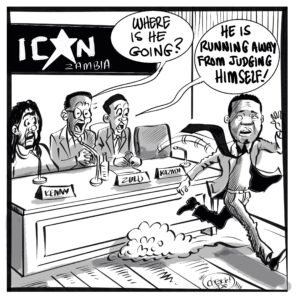We have a backlog of laws to enact before we can look at the Access to Information Bill, says Justice Minister Given Lubinda.
And Lubinda says freedom of expression has a limit.
Speaking during the World Press Freedom Day commemorations at Government Complex in Lusaka today, Lubinda said the Ministry of Justice had a backlog of laws to enact.
“Coming to Access to Information, two facts have to be noted, the constitution provides that the public service has the responsibility to produce timely and accurate information to the public. The ATI bill is underway, I know that we are all anxious to ensure that this is done away with. ATI is not for the press, but for the enhancement of living conditions for all citizens, therefore, this process should not be done tomorrow, but should have been done five years ago,” Lubinda said.
“But we have to live with the reality of living with a heavy backlog of legislation especially this past year when we were enacting the constitution. The backlog is huge, but is should not be used as an excuse to shelve the legislation of ATI bill. We are determined to come up with the ATI legislation.”
And Lubinda said freedom of expression had a limit.
“Journalists give us information on what’s going on in our community, you give a voice to the voiceless. The media exposes injustices and keeps people in decision-making positions like myself, accountable. However, I must say that freedom of expression has its limit. The privacy of others must be respected,” he said.
“If the media is abused, it can destroy nations and generations. We also know of how many characters who have worked hard to achieve in life, have been destroyed by irresponsible and malicious propaganda by the media. Some of the malice from some sections of online media are done with pure criminality under the guise of press freedom. That has to be stopped.”
Lubinda also observed that more and more media organisations were being registered.
“Less than a decade ago, media regulation was on the verge of being passed by your parliament, when, when the PF government was formed, we allowed the press to operate freely. The PF liberated all Media houses to belong to the self-regulatory media council. The Independent Broadcasting Authority in Zambia has witnessed an unprecedented media houses taking to the airwaves. In 2011, we had less than 50 radio, today we have 110. We previously had on three credible TV stations, today we have more than 40 with more to come,” Lubinda said.
“All discerning people will agree with me that the government of Edgar Lungu is a champion of freedom of the press. That is why we gave a YES vote to the Referendum because we wanted the Bill of Rights to guarantee the right for freedom of the media. Although the Referendum failed, the triumph of President Lungu must give you hope that not all is lost, as he remains committed to ensuring a free environment for the press to operate in.”
He also said government did not condone attacks on journalists.
“Your government does not condone the abuse of journalists, if it has not been done enough, I would like to say here that we condemn hooligans from political party cadres who attacks journalists as they conduct their duty. All those media houses which had their license revoked, confessed that they offended the conditions under which their licenses were given. Should ZRA be restrained from collecting taxes which will provide water to the people of Shang’ombo simply because those taxes are owed by private media?” asked Lubinda.
























